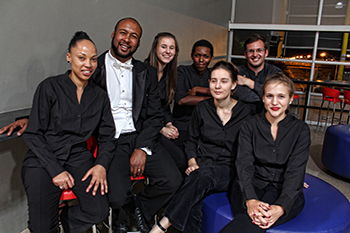Latest News Archive
Please select Category, Year, and then Month to display items
12 October 2020
|
Story Arina Engelbrecht
|
Photo Supplied
 Arina Engelbrecht from Organisational Development and Employee Well-being believes physical activity has a number of benefits for one’s health, including stress relief.
Arina Engelbrecht from Organisational Development and Employee Well-being believes physical activity has a number of benefits for one’s health, including stress relief.
Being physically active plays a big role in preventing the development of mental-health problems and in improving the quality of life of people experiencing mental-health problems.
Treatment for depression
Physical activity can be an alternative treatment for depression. It can be used as a stand-alone treatment or in combination with medication and/or psychological therapy. It promotes all kinds of changes in the brain, including neural growth, reduced inflammation, and new activity patterns are formed that promote feelings of calm and well-being. It releases endorphins – powerful chemicals in the brain that energise your spirit and make you feel good.
Physical activity can be very effective in relieving stress. Research in adults has found that physically active individuals tend to have lower stress levels compared to individuals who are less active. It also leads to improved sleep. When a person sleeps better and feels more rested, overall quality of life improves. They cope better with daily life stressors.
Reduce Alzheimer's risk
Regular physical activity can reduce your risk of developing Alzheimer's disease by up to 50%. It can also slow down further deterioration in those who have already started to develop cognitive problems. It stimulates the brain’s ability to maintain old connections as well as to make new ones.
A study asked people to rate their mood immediately after periods of physical activity (e.g. going for a walk/run, cycling, doing housework) and periods of inactivity (e.g. reading a book or watching television). Researchers found that participants felt more content, more awake, and calmer after being physically active compared to after periods of inactivity.
In conclusion, people who are physically active feel a sense of well-being, feel more energetic throughout the day, sleep better at night, have sharper memories, and feel more relaxed and positive about themselves and their lives.
“Being physically active not only changes your body, it changes your mind,
attitude, and your mood.” – Arina Engelbrecht
OSM Camerata first place winner in international competition
2017-09-08

The OSM Camerata with conductors, Xavier Cloete and
Gerhard de Jager received first place in the
University/Conservatory Orchestra category.
Photo: Supplied
The OSM Camerata received first place in the 2017 Ictus International Music Competition for bands and orchestras. Marius Coetzee from the Odeion School of Music at the University of the Free State said: “The award was announced in time for the celebration of the orchestra’s fifth birthday.”
OSM a catalyst for excellence
The OSMC was strategically founded in 2012 by Coetzee as the OSM’s flagship chamber ensemble, with the main objective of creating a catalyst for excellence.
Over the past five years, the OSMC has premiered 15 new works by South African composers specially commissioned for them. Highlights remain its participation in the 13th International Conservatory Festival in St Petersburg Russia, where the ensemble received a standing ovation during a gala concert in the Glazunov Concert Hall, as well as the world première of the Cello Concerto for an African Cellist by South African composer, Hans Huyssen, with South African cellist, Heleen du Plessis as soloist. The CD was released in 2014 on the New Zealand Classical Music label, Ode Records in Auckland, New Zealand and was one of five CDs nominated for the Listeners' Choice Award New York in March 2014.
Competition draws participation from Washington to Bloemfontein
The inaugural year of this annual competition drew applicants from Washington State in the US all the way to Bloemfontein in the Free State. Video submissions were judged and narrowed down to a final round from which prize winners were selected.
The OSM Camerata with conductors, Xavier Cloete and Gerhard De Jager, received first place in the University/Conservatory Orchestra category.
The competition was founded to highlight the work that music educators, conductors, students, performers and community members make in ensembles at the university, community, youth, high school and middle school levels.
Competition director, Alex Serio says that “many people do not realise the amount of work that it takes to make these ensembles run. What is more is that most of the public does not realise the level of artistic excellence that can be achieved in these ensembles. Ictus International Music Competition was founded to highlight this level